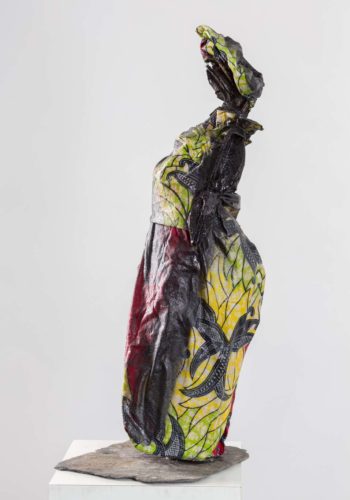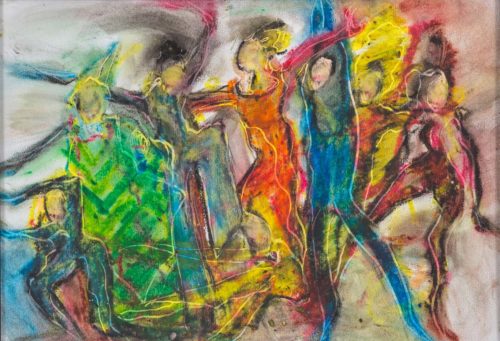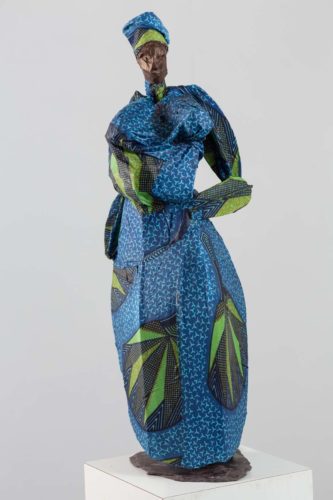Ekua Bayunu just finished mounting her first solo exhibition at Manchester’s Chuck Gallery. Aptly titled Re:Birth, her show centers around a body of sculptural work reflecting women’s power and draws on aesthetic motifs of her African cultural heritage. After receiving a few rave reviews of her show, she was selected in February to be artist-in-residence in Alexandra Park for the final season of Alexandra Arts’ Pankhurst in the Park Program. Recently, I had the opportunity to connect with the artist personally and dive more deeply into her background and the motivations behind her trans-disciplinary, social-justice oriented creative practice.
Ekua was born in 1961 in a small town called Yateley, south of London. Her home for a mere 6 weeks, her early years were shaped by the impact of Maori culture upon White English Middleclass sentiment delivered to an African dual heritage child. She recalls somewhat bitter-sweetly how her mother’s overflowing creativity dynamically shaped her childhood. She still has one of her mother’s original watercolor paintings dating back to the 1940s, which her mother made while living in China working as an English Christian Missionary. Although Ekua’s mom started painting again in her 70’s, she never seriously pursued her craft. She infused Ekua’s upbringing with ample creativity – “the freedom to draw and glue and whittle and sing and dance,” says the artist. Her mother likewise always chided her, “We aren’t the type of people who are artists.” Paradoxically, as evolution sometimes goes, it was the way her mom steered the rebellious young Ekua away from Art – often with statements like “it isn’t our place” – that ultimately drove Bayunu to become the artist she is today. Ekua simply had to challenge the limitations imposed. “I couldn’t bear not being one. I think [my Mother] couldn’t bear not being one either.”
Bayunu’s formal Arts Education began at Nene College, now Northampton University. She completed her Foundation in Art and Design at Gloucestershire College of Art and Design before entering her BFA, Sculpture, through a prestigious Honours program at St. Martins School of Art and later Hornsey School of Art, both in London, in the early 1980s. Ekua reflects that at St. Martin’s they always worked from a life model, a practice which greatly influences her work to this day, certainly reflected in the visceral tactility of her sculptural renderings as well as her humanistic approach. Into adulthood, as a single mother, Ekua worked in arts education and management, including developing a sculpture curriculum for adults that dovetailed on her undergraduate studies. Living in Manchester since 1993, she has delivered a number of highly acclaimed public art projects including the Sensory Garden in Hulme Park and the Anansi Mosaics at Royce Primary School. As a project manager, she has been instrumental in making art accessible to young people from all backgrounds in Manchester’s increasingly diverse city center.1 In 2011, Ekua made the decision to return to her personal art practice full time. Her current body of work includes drawing, film and sculpture in card, fabric, wood and clay – air dried and fired. Moving forward she intends to begin working in metal, casting and welding, as well as carving wood and stone (skill areas not touched since her undergraduate days).
Her recent body of work Re:Birth explores the condition of being human, and creates dialogue around looking and being seen – particularly as a Black Female – underlined with the artist’s steady commitment to three principles she articulates as “Change. Equality. Love.” Her show at Chuck, the only UK Art Gallery outside of London specializing in Modern and Contemporary Art of the African Diaspora, was created in response to selected works in the Chuck Gallery’s permanent collection over a year-long engagement in the space in dialogue with its roster of contemporary masters.
Three female figures (the artist’s Okoh Women series) respond to Nelson Okoh’s painting Poetic Expression – “highlighting the weight and volume and strength of women’s bodies; our breasts, bellies, hips as the vessels to carry us forward to stand in our power.” Her work expands on a feminist polemic insisting that women’s beauty and embodied freedom “will not be defined or minimized just for the sexual gratification of the other.” Ekua’s Leadership Series features a pair of elongated, two-faced figures produced in response to the painting Elder Statesmen by Abayomi Sokenu. “I am exploring the current need in the world for leadership that can support humanity against the rising tide of extremism from the Racism of Trump, the Sexism of Putin, the Classism of May, the Intolerance of Wahhabism and Zionism and Right-Wing Christianity.” In a globalized, media-saturated culture still overwhelmed by limited and too often negative depictions of black and brown folks, paralleling perhaps, the global BLACK LIVES MATTER movement, her pieces infuse African faces with the values of leadership, Intelligence, Honesty, Compassion and Integrity.
The final piece from this new body of work, titled Her Smile, is still in process. It is in response to the work of Damola Adepoju, an artist whose mixed media pieces depict cityscapes of urban Lagos. Although Adepoju is an artist Ekua personally loves and has collected the work of, Her Smile is created in reaction to three paintings of his in the Chuck collection that depict the female form. Ekua takes issue with his depiction of the women who appear in the work as coy objects, veiled behind strands of hair they offer a stereotypical come-hither appeal to the viewer. “Pieces that, for me, appear created purely for a male gaze.” In response, the artist created a sculptural figure of a woman with an unflinching stare. Straight, bold lines and strong vertical and horizontal planes articulate the female subject’s commanding presence. “You have touched the women” and “you have struck a rock” are textural inscriptions Ekua has layered in to enhance the surface of the work.
Enjoying the public engagement aspects of her solo show at Chuck in collaboration with Global Arts Manchester and PANDA, she aims to offset the challenges older women artists face (and particularly those from cultures not traditionally supported by the Fine Arts in her country), helping them return to or enter creative practice. The overall mission of Global Arts Manchester, of which Ekua is a founding member, is to ensure that the visual arts in Manchester are diverse, sustainable, accessible and inclusive. Ekua is working with Global Arts to develop an offer through a health and wellbeing initiative to train artists to share their practice to vulnerable individuals in community settings and secondly, exploring how to give career support to young creative graduates from backgrounds underrepresented in the arts.
Ekua draws from Steve Biko when situating her oeuvre generally, quoting him “…the greatest gift still has to come from Africa – giving the world a more human face.” Her sculptures about leadership reflect what is needed in the world today and put an African face on power and authority. Her observation that the Fine Art world is not necessarily a welcoming space for women and people of color is certainly a familiar feeling for many. In one sense, there’s the statistical reality of the way in which non-white, non-male, non-cis-gendered voices are continually marginalized within the canon and economically kept out of the loop, and on the other, Afrocentric logic broadly speaking offers such an overwhelmingly more robust definition of Art we might imagine why the work of contemporary African Diasporic artists doesn’t easily translate to a Eurocentric system. Take, for example, Senegalese poet and philosopher Léopold Sédar Senghor’s primordial intuition that African Art is a total philosophy. It is the “vitalism” at the core of African spiritual beliefs that found expression in the Arts.2 It’s intricately woven into the social fabric of life itself.
The Western* white-male dominated field of Fine Art and art marketplace – (Western here denoting more of a mindset than a geographical location at this point) – poses several peculiar problems for an artist wielding the sword of Afrocentric logic. The “Art World,” in my opinion, being at best an elite ego racket, at worst a parasitic Cyclops suckling the reckless libido of generations of young creatives (who pledge their faith in materialism and fame) to obscure the laundering of money in a nepotistic black market money game. Although Afrocentrism is a vast constellation of beliefs in and of itself, the Seven Principles of Kwanzaa3 – unity, self-determination, collective work and responsibility, cooperative economics, purpose, creativity and faith – highlight the ways in which Art just can’t and shouldn’t be separated out from the life blood of the clan. Art should ensure the longevity, vitality, cohesion and prosperity of the group, and I think this is where women like Ekua are needed so dearly as leaders – to ensure there is an ethics around the production, commerce, education and dialogue that happens around Art. Ekua, although trained in the highest and most honorable echelons of the Euro-sphere, stays close to the principles for which and by which she makes Art – for the betterment of her society and community – and likewise finds congruency doing social practice work in collaboration with local non-profits.
That being said, “not-for-profit” clearly poses its own limitations living in one of the world’s most expensive nations. In the midst of her many creative projects, Ekua recently received notice that her studio space at Artwork Atelier (located in an old warehouse in Salford, Greater Manchester) has been sold to developers who have plans to knock the creative complex down and build luxury apartments as soon as August. “Being in a community of artists is so important to my professional development and my creative and emotional well being,” remarks Ekua, who is frustrated to see her space and communal atelier disbanded in this way. Like many artists, resources, space, and an ongoing internal dialogue vacillating between self-confidence and self-doubt – pose the greatest challenges for her in terms of continuing to make work.
Despite any setbacks, she’s rocketing ahead into new projects including recently finishing a new sculptural work which premiered at the Manchester Museum during an event celebrating FESTAC77. As early as March, Ekua will be collaborating as an actor on a new film project with Rwandan Theatre practitioner Emanuel Bajiji.
Ekua was selected for the Spring residency at Alexandra Arts largely due to her steady and ongoing engagement building art networks that transgress Manchester’s varied communities and focus on supporting women’s creativity, leadership and livelihood. “I know so many people who live locally and haven’t felt engaged with the park over the last few years,” says Ekua, who is excited to step into her position at Alexandra Park, where she will be participating in an 8-week, interdisciplinary and socially engaged project culminating in a series of site-specific, visual totems: “Guardians of the land and community.” The social practice component of the project will involve instruction of all-ages workshops in the Chorlton Lodge and collecting a women’s oral herstory reflecting the overall mission of Alexandra Arts – which celebrates women’s fight for suffrage rights and agency in light of Alexandra Park being the historic stomping ground of Europe’s suffragettes and home of Emmeline Pankhurst.
Having frequently hosted people from all ends of the globe while supplementing her income with AirBnb, Ekua feels inclined to celebrate the diversity of women’s voices she has come to know and love, living in Manchester for nearly three decades, in this new work. “The overall aim of my project is to inspire people from all socio-economic and cultural backgrounds to vote and play an active role in shaping cultural and political life in Manchester. “Women Hold Up Half the Sky” inspires more Women in Leadership through the creation of dialogue and networks of mutual support that span class and race, sexuality and disability. I truly believe Culture and Creativity are at the heart of women’s Active Citizenship,” explains the artist. She’s planning to call upon her connections with local libraries, senior centers, youth clubs, art centers and other service providers to fully get this project off the ground.
Stay tuned as Ekua’s “Women Hold Up Half the Sky” takes shape in Moss Side Manchester’s Alexandra Park this Spring during the final Installment of Pankhurst in the Park (funded by Arts Council England) to celebrate the centenary for UK women winning the right to vote. Come September Alexandra Arts’ will be teaming up with Art 511 for a grand art salon here in New York City, continuing its mission to support female artists and their paradigm-shifting practices. If you live locally, stay abreast of this project via the Alexandra Arts website and blog. You can follow on instagram @alexartsmcr. Ekua’s looking to engage women, as co-creatrix, videographers, herstorians (and more!) during her 8-week long “Women Hold Up Half the Sky” initiative this Spring.
This article was commissioned by Alexandra Arts for the special print edition of Art 511 Mag celebrating International Women’s Day and the centenary for UK women’s suffrage [funded by ARTS COUNCIL ENGLAND] during the Pankhurst in the Park 2018 season.
- There are over 300 languages now regularly spoken in Great Britain (Diane Abbott, The Guardian, 2016) and population stats show that in the early 2000’s over 3 million immigrants were admitted into the U.K. by way of controversial Labor & Immigration Laws (Sir Andrew Greene / Daily Mail, 2011)
- Souleymane Bachir Diagne, African Art A Philosophy University of Chicago Press, 2012
- Kwanzaa is a feast of gift giving originating in the United States in the 60s observed today by as many as 18 million African Americans from December 26 to January 1 as a celebration of their cultural heritage and traditional values. Each day of Kwanzaa emphasizes one of the seven principles, or Nguzo Saba, a set of ideals.


